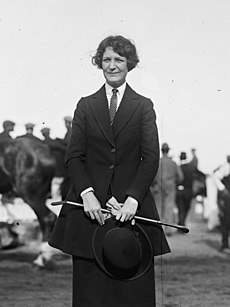Alice Mariarsdóttir
Alice Mariarsdóttir | |
|---|---|
 | |
| First Minister of Norvia | |
| In office 1946–1958 | |
| Personal details | |
| Born | 29 May 1901 |
| Died | 25 September 1969 (aged 68) Grafholmen, Norvia, Delkora |
| Political party | Farmers' Alliance |
| Alma mater | University of Grafholmen |
Alice Mariarsdóttir (29 May 1901 – 25 September 1969) was a Delkoran businesswoman, socialite, and politician who served as First Minister of Norvia from 1946 to 1958. She was one of the founding figures of the state's Farmers' Alliance, which had a significant impact on Norvian politics.
Early life
Alice Mariarsdóttir was born on 29 May 1901 in Norvia. She came from a Lebøvian family, and had a matronymic instead of a surname due to parental choice. She had a younger brother, Paul (1907–1999).
Coming from a well-off background, she studied at the University of Grafholmen, earning a degree in agronomy, and as a teenager spent her summers traveling in Eracura and Siduri. She married a high society figure at her parents' insistence in 1926, but the marriage was unsuccessful due to mutual incompatibility and ended in divorce in 1945. Instead, she began a business career in agriculture, with modest success.
First Minister of Norvia
Alice grew interested in state politics. She felt an affinity for the Agrarian Party, but was disgusted by the federal party's subservience to the Conservatives in the Veidnar Albendor government. The Albendor government's budgets, seen as extremely disadvantageous to Norvia, provoked a revolt in the state's Agrarian Party, which disaffiliated itself from its federal counterpart in protest.
Alice played a prominent role in the revolt and secured a merger with the state branch of the Democratic Farmers' Party, forming the Farmers' Alliance. It won a plurality in the 1946 state election, and she formed a minority government backed by National Labor and the Liberals. She would lead the party to re-elections in 1950 and 1954, with slightly larger pluralities.
Ideologically, she was a moderate with paternalistic conservative tendencies. She opposed small government ideology and was liberal on social issues.
She passed a series of progressive and social democratic reforms, which included the expansion of agricultural cooperatives, the establishment of a state-owned grain elevator, expansion of transportation infrastructure, modernisation of schools and hospitals, and strengthening welfare programs. Her main preoccupation as first minister was the health of Norvian agriculture, and she sought to promote agricultural education and work over industry.
Her agenda put her into conflict with Albendor's federal government, the two repeatedly clashing over federal–state fiscal issues. On one occasion, she imposed a "boycott" of Delkora to put pressure on the government, halting Norvian trade with the other states and instead expanding trade with Megelan.
Alice had a modest public image and strove to position herself as a "champion of the small farmer" against industry and agricultural big business. She was a passionate equestrienne and often simply wore her horse-racing suit and bowler hat in public, earning her the nickname "Gentleman Alice".
Her conflicts with Albendor embittered her towards the Conservatives — during one election campaign, she stood on a pile on manure and began her speech by apologising to the crowd for speaking from a Conservative platform.
Her last term was marred by the 1950s depression, which she tried to combat by taking all forests into state ownership and building hydroelectric power plants. Faced with little help from the federal government and suffering from stress, she announced her retirement for health reasons in 1958. At that year's state election, National Labor won a plurality but the Farmers' Alliance finished second, and the two formed a coalition.
Later life and death
Alice remained an elder stateswoman for the Farmers' Alliance and Norvian politics, but declined offers to move to federal politics. At the 1959 federal election, she supported National Labor, which won a landslide victory. She became a prominent centrist to centre-right figure supporting the New Kingdom program, together with Moderate leader Edith Pedersen. She was appointed by Mette Elvensar as head of the Federal Forestry Office from 1959 to 1967.
She died on 25 September 1969 in a Grafholmen hospital.
Legacy
Alice remains one of Norvia's best-known first ministers. Her role in the creation of the Farmers' Alliance transformed Norvian politics by establishing a strong state-only party, countering the rightward drift of the federal Agrarians and the later merger of the Democratic Farmers' Party into the Liberals outside Norvia.
Starting in the 1960s, the Farmers' Alliance enjoyed two decades as the major competitor of National Labor and the Liberals. Even after it was relatively displaced by the emergence of the New Conservatives in the 1980s, it remains a major party in Norvia, regularly finishing in second or third place at state elections.